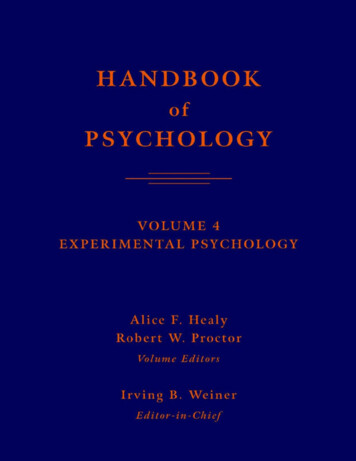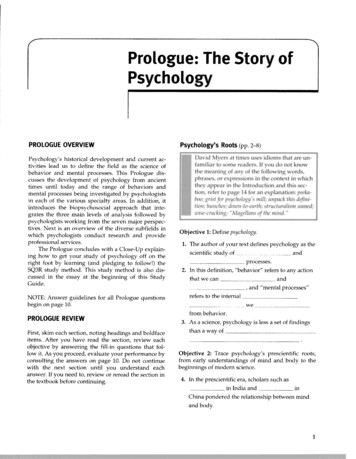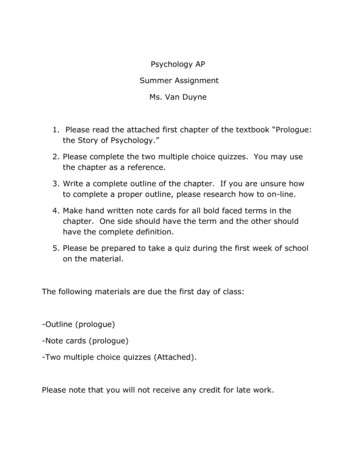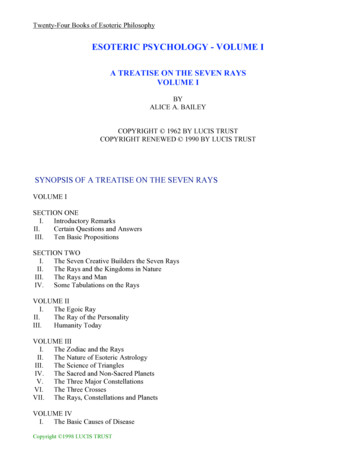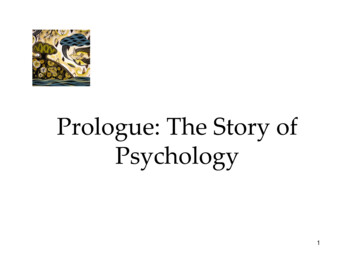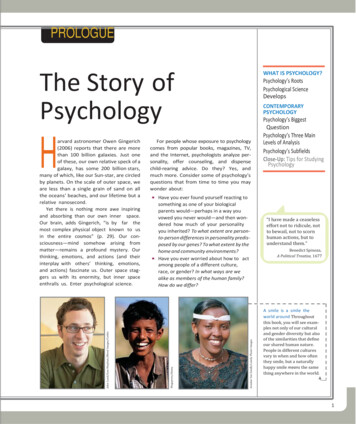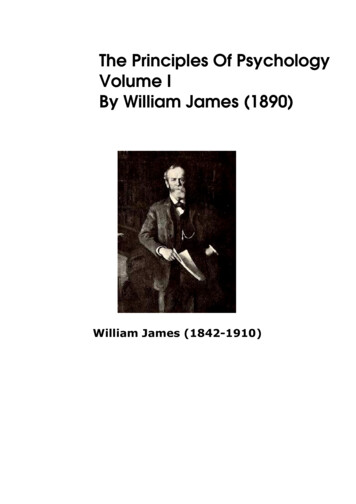
Transcription
The Principles Of PsychologyVolume IBy William James (1890)William James (1842-1910)
The Principles of Psychology Volume I - William JamesContents - Click on the Links Below orUse the BookmarksChapter 1. The Scope of PsychologyChapter 2. The Functions of the BrainChapter 3. On Some General Conditions ofBrain ActivityChapter 4. HabitChapter 5. The Automaton TheoryChapter 6. The Mind-Stuff TheoryChapter 7. The Methods and Snares ofPsychologyChapter 8. The Relations of Minds to OtherThingsChapter 9. The Stream of ThoughtChapter 10. The Consciousness of SelfChapter 11. AttentionChapter 12. ConceptionChapter 13. Discrimination and ComparisonChapter 14. AssociationChapter 15. The Perception of TimeChapter 16. Memory2
The Principles of Psychology Volume I - William JamesCHAPTER IThe Scope of PsychologyPsychology is the Science of Mental Life,both of its phenomena and of their conditions. Thephenomena are such things as we call feelings,desires, cognitions, reasonings, decisions, and thelike; and, superficially considered, their variety andcomplexity is such as to leave a chaotic impressionon the observer. The most natural and consequentlythe earliest way of unifying the material was, first,to classify it as well as might be, and, secondly, toaffiliate the diverse mental modes thus found, upona simple entity, the personal Soul, of which they aretaken to be so many facultative manifestations.Now, for instance, the Soul manifests its faculty ofMemory, now of Reasoning, now of Volition, or againits Imagination or its Appetite. This is the common-sense. Another and a less obvious way ofunifying the chaos is to seek common elements inthe divers mental facts rather than a common agent3
The Principles of Psychology Volume I - William Jamesbehind them, and to explain them constructively bythe various forms of arrangement of these elements,as one explains houses by stones and bricks. The'associationist' schools of Herbart in Germany, andof Hume, the Mills and Bain in Britain, have thusconstructed a psychology without a soul by takingdiscrete 'ideas,' faint or vivid, and showing how, bytheir cohesions, repulsions, and tions, emotions, volitions, passions, theories,and all the other furnishings of an individual's mindmay be engendered. The very Self or ego of theindividual comes in this way to be viewed no longeras the pre-existing source of the representations,but rather as their last and most complicated fruit.Now, if we strive rigorously to simplify thephenomena in either of these ways, we soonbecome aware of inadequacies in our method. Anyparticular cognition, for example, or recollection, isaccounted for on the soul-theory by being referredto the spiritual faculties of Cognition or of Memory.4
The Principles of Psychology Volume I - William e properties of the soul; that is, to take thecase of memory, no reason is given why we shouldremember a fact as it happened, except that so torememberitconstitutestheessenceofourRecollective Power. We may, as spiritualists, try toexplain our memory's failures and blunders bysecondary causes. But its successes can invoke nofactors save the existence of certain objective thingsto be remembered on the one hand, and of ourfaculty of memory on the other. When, for instance,I recall my graduation-day, and drag all its incidentsand emotions up from death's dateless night, nomechanical cause can explain this process, nor canany analysis reduce it to lower terms or make itsnature seem other than an ultimate datum, which,whether we rebel or not at its mysteriousness, mustsimplybetakenforgrantedifwearetopsychologize at all. However the associationist mayrepresentthepresentideasasthrongingandarranging themselves, still, the spiritualist insists, he5
The Principles of Psychology Volume I - William Jameshas in the end to admit that something, be it brain,be it 'ideas,' be it 'association,' knows past time aspast, and fills it out with this or that event. Andwhen the spiritualist calls memory an 'irreduciblefaculty,' he says no more than this admission of theassociationist already grants.And yet the admission is far from being asatisfactory simplification of the concrete facts. Forwhy should this absolute god-given Faculty retain somuch better the events of yesterday than those oflast year, and, best of all, thoseWhy,again,inoldageof an hour ago?shoulditsgraspofchildhood's events seem firmest? Why should illnessand exhaustion enfeeble it? Why should repeatingan experience strengthen our recollection of it? Whyshould drugs, fevers, asphyxia, and content ourselves with merely affirming that thefaculty of memory is so peculiarly constituted bynature as to exhibit just these oddities, we seemlittle the better for having invoked it, for our6
The Principles of Psychology Volume I - William Jamesexplanation becomes as complicated as that of thecrude facts with which we started. Moreover there ulistheintheequippedwithelementary powers of such an ingeniously intricatesort. Why should our memory cling more easily tothe near thanthe remote? Why should it lose itsgrasp of proper sooner than of abstract names?Such peculiarities seem quite fantastic; and might,for aught we can see a priori, be the preciseopposites of what they are. Evidently, then, thefaculty does not exist absolutely, but works underconditions; and the quest of the conditions becomesthe psychologist's most interesting task.However firmly he may hold to the soul andher remembering faculty, he must acknowledge thatshe never exerts the latter without a cue, and thatsomething must always precede and remind us ofwhatever we are to recollect. "An idea!" says ed thing; and this explains also why7
The Principles of Psychology Volume I - William ed, for their associates on the variousoccasions furnish so many distinct avenues ofrecall." But this does not explain the effects of fever,exhaustion, hypnotism, old age, and the like. And ingeneral, the pure associationist's account of ourmental life is almost as bewildering as that of thepure spiritualist. This multitude of ideas, existingabsolutely, yet clinging together, and weaving anendless carpet of themselves, like dominoes -whence do they get their fantasticlaws of clinging, and why do they cling in just theshapes they do?For this the associationist must introduce theorder of experience in the outer world. The dance ofthe ideas isa copy, somewhat mutilated andaltered, of the order of phenomena. But the slightestreflection shows that phenomena have absolutely nopower to influence our ideas until they have firstimpressed our senses and our brain. The bare8
The Principles of Psychology Volume I - William Jamesexistence of a past fact is no ground for ourrememberingit.Unlesswehaveseenit,orsomehow undergone it, we shall never know of itshaving been. The experiences of the body are thusone of the conditions of the faculty of memory beingwhat it is. And a very small amount of reflection onfacts shows that one part of the body, namely, thebrain, is the part whose experiences are directlyconcerned. If the nervous communication be cut offbetween the brain and other parts, the experiencesof those other parts are non-existent for the mind.The eye is blind, the ear deaf, the hand insensibleand motionless. And conversely, if the brain beinjured, consciousness is abolished or altered, evenalthough every other organ in the body be ready toplay its normal part. A blow on the head, a suddensubtraction of blood, the pressure of an apoplectichemorrhage, may have the first effect; whilst a veryfew ounces of alcohol or grains of opium orhasheesh, or a whiff of chloroform or nitrous oxidegas, are sure to have the second. The delirium of9
The Principles of Psychology Volume I - William Jamesfever, the altered self of insanity, are all due toforeign matters circulating through the brain, or topathological changes in that organ's substance. Thefact that the brain is the one immediate bodilycondition of the mental operations is indeed souniversally admitted nowadays that I need spend nomore time in illustrating it, but will simply postulateit and pass on. The whole remainder of the book willbe more or less of a proof that the postulate wascorrect.Bodily experiences, therefore, and moreparticularly brain-experiences, must take a placeamongst those conditions of the mental life of whichPsychology need take account. The spiritualist andthe associationist must both be 'cerebralists,' to theextent at least of admitting that certain peculiaritiesin the way of working of their own favorite principlesare explicable only by the fact that the brain lawsare a codeterminant of the result.Our first conclusion, then, is that a certainamount of brain-physiology must be presupposed or10
The Principles of Psychology Volume I - William Jamesincluded in Psychology[1]. In still another way the psychologist is forced to be something of a nerve-physiologist.Mental phenomena are not only conditioned a parteante by bodily processes; but they lead to them a parte post. That they lead to acts is of course themost familiar of truths, but I do not merely mean acts in the sense of voluntary and deliberate muscular performances. Mental states occasion alsochanges in the calibre of blood-vessels, or alterationin the heartbeats, or processes more subtle still, in glands and viscera. If these are taken into account, as well as acts which follow at some remote periodbecause the mental state was once there, it will besafe to lay down the general law that no mentalmodification ever occurs which is not accompaniedor followed by a bodily change. The ideas andfeelings,e.g.,whichthesepresentprinted characters excite in the reader's mind not onlyoccasionmovementsofhiseyesandnascentmovements of articulation in him, but will some dayEtext Conversion Project - Nalanda Digital Library11
The Principles of Psychology Volume I - William Jamesmake him speak, or take sides in a discussion, or give advice, or choose a book to read, differently from what would have been the case had they neverimpressed his retina. Our psychology must thereforetake account not only of the conditions antecedent to mental states, but of their resultant consequencesas well. But actions originally prompted by consciousastobeStanding, intelligence may grow so automatic by dint of rformed.unbuttoning, piano-playing, talking, even saying one's prayers, may be done when the mind is absorbed in otherthings. The performances of animal instinct tion certainly are so. Yet they resembleintelligent acts in bringing about the same ends atwhichtheanimals'consciousness, occasions, deliberately aims.onotherShall the study ofsuch machine-like yet purposive acts as these beincluded in Psychology?Etext Conversion Project - Nalanda Digital Library12
The Principles of Psychology Volume I - William JamesThe boundary-line of the mental is certainly vague. It is better not to be pedantic, but to let the science be as vague as its subject, and include suchphenomena as these if by so doing we can throwany light on the main business in hand. It will ere long be seen, I trust, that we can; and that we gainmuch more by a broad than by a narrow conception of our subject. At a certain stage in the development of every science a degree of vagueness is what bestconsists with fertility. On the whole, few recentformulas have done more real service of a rough sort in psychology than the Spencerian one that the essence of mental life and of bodily life are one,namely, 'the adjustment of inner to outer relations.'Such a formula is vagueness incarnate; but becauseit takes into account the fact that minds inhabitenvironments which act on them and on which theyin turn react; because, in short, it takes mind in the midst of all its concrete relations, it is sychology,' which treated the soul as a detachedEtext Conversion Project - Nalanda Digital Library13
The Principles of Psychology Volume I - William Jamesexistent, sufficient unto itself, and assumed to consider only its nature and properties. I shall therefore feel free to make any sallies into zoologyor into pure nerve-physiology which may seeminstructive for our purposes, but otherwise shall leave those sciences to the physiologists.Can we state more distinctly still the manner in which the mental life seems to intervene between impressions made from without upon the body, andreactions of the body upon the outer world again?Let us look at a few facts. If some iron filings be sprinkled on a table and a magnet brought near them, they will flythrough the air for a certain distance and stick to itssurface. A savage seeing the phenomenon explainsit as the result of an attraction or love between themagnet and the filings. But let a card cover thepoles of the magnet, and the filings will press forever against its surface without its ever occurringto them to pass around its sides and thus come intomore direct contact with the object of their love.Etext Conversion Project - Nalanda Digital Library14
The Principles of Psychology Volume I - William JamesBlow bubbles through a tube into the bottom of a pail of water, they will rise to the surface and mingle with the air. Their action may again be poeticallyinterpreted as due to a longing to recombine withthe mother-atmosphere above the surface. But if you invert a jar full of water over the pail, they willrise and remain lodge
The Principles of Psychology Volume I - William James Etext Conversion Project - Nalanda Digital Library 11 included in Psychology[1]. forced to be something of a nerve-physiologist. Mental phenomena are not only conditioned a parte ante by bodily processes; but they lead to them a parte post. That they lead to acts is of course the
